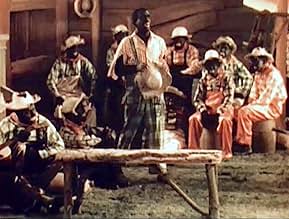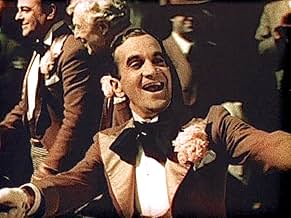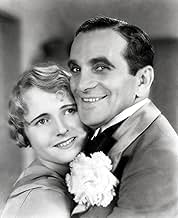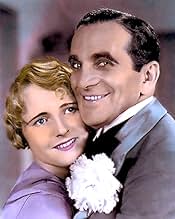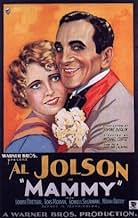Ajouter une intrigue dans votre langueA love triangle develops in a traveling minstrel troupe.A love triangle develops in a traveling minstrel troupe.A love triangle develops in a traveling minstrel troupe.
- Réalisation
- Scénario
- Casting principal
- Récompenses
- 1 victoire au total
Allan Cavan
- Doctor
- (non crédité)
Richard Cramer
- Detective
- (non crédité)
Stanley Fields
- Pig Eyes
- (non crédité)
Lloyd Ingraham
- Deputy Sheriff
- (non crédité)
Ben Taggart
- Sheriff
- (non crédité)
Grant Withers
- Reporter in Trailer
- (non crédité)
Avis à la une
MAMMY (Warner Brothers, 1930), directed by Michael Curtiz, became Al Jolson's fourth feature, following earlier screen efforts as "The Jazz Singer" (1927), "The Singing Fool" (1928) and "Say It With Songs" (1929). Although not one of the best in the Jolson series, the movie somewhat hits home to Jolson's early years as a minstrel man. With the songs by Irving Berlin, he is also credited with its story idea titled "Mr. Bones."
Al Jolson stars as Al Fuller, the lead singer of a minstrel show. He is hopelessly in love with Nora Meadows (Lois Moran), the daughter of the minstrel manager (Hobart Bosworth), but her real interest is in Billy West (Lowell Sherman), the interlocutor who ignores her so he can keep his eyes on other women. One night during a comedy act, Al, who is to "shoot" Westy at the close of the skit, finds Westly on the floor unconscious, and soon realizes that someone had placed real bullets in his gun. Following the performance, Al is arrested for attempted murder. When the police wagon that's carrying Al turns over, Al escapes. Bumming around in freight trains and eluding the law, he decides to pay his mother (Louise Dresser) her long-awaited visit. Knowing that something is wrong with her son, Mrs. Fuller doesn't let on, but she does gives Al her motherly advice in saying, "If anyone says anything against you, son, always MAKE THEM PROVE IT." Knowing that he is innocent of the shooting, Al decides to take her advice and go back to face the music, but when he does, he finds a different tune awaiting him.
Music and lyrics by Irving Berlin include: "Let Me Sing and I'm Happy," "Here We Are," "Who Paid the Rent for Mrs. Rip Van Winkle?" "The Knights of the Road," "Yes, We Have No Bananas" (by Frank Silver and Irving Cohn); Guiseppi Verdi's "Miserere" from Il TROVATORE; "Looking At You Across the Breakfast Table," "Here We Are" (reprise); "In the Morning," "Why Do We Take the Night Boat to Albany?" "Swanee River" (by Stephen Foster); "Let Me Sing and I'm Happy" (reprise); "To My Mammy" (sung by Jolson to Louise Dresser); and "Let Me Sing and I'm Happy" (closing number). Of all the songs presented here, "Let Me Sing and I'm Happy" comes off best, sung three times by Jolson, each in a different style.
Originally filmed in early Technicolor, existing prints today are shown in black and white. Storyline is passable, but does have its slow points, one in which Jolson's purposely stutters to a visiting sheriff (Jack Curtis) so to give the theater troupe time to take off on a train, only to learn that the sheriff isn't there to arrest anybody, but to join the company; and another when Jolson gets drunk, a scene that appears longer than what it is. Jolson's acting hasn't improved much dramatically but succeeds in perking up the plot with his energetic singing. Also featured in the cast are Tully Marshall as Slats, Al's tag-along hobo he befriends in a freight car during his escape from the law; Stanley Fields and Mitchell Lewis, among others.
Due to the controversy of the movie, mainly because of it lengthy minstrel show routines, "Mammy" is a rarity on TV, or anywhere for that matter. Currently available on video cassette, it can also be seen sporadically on late night cable television's Turner Classic Movies.(**)
Al Jolson stars as Al Fuller, the lead singer of a minstrel show. He is hopelessly in love with Nora Meadows (Lois Moran), the daughter of the minstrel manager (Hobart Bosworth), but her real interest is in Billy West (Lowell Sherman), the interlocutor who ignores her so he can keep his eyes on other women. One night during a comedy act, Al, who is to "shoot" Westy at the close of the skit, finds Westly on the floor unconscious, and soon realizes that someone had placed real bullets in his gun. Following the performance, Al is arrested for attempted murder. When the police wagon that's carrying Al turns over, Al escapes. Bumming around in freight trains and eluding the law, he decides to pay his mother (Louise Dresser) her long-awaited visit. Knowing that something is wrong with her son, Mrs. Fuller doesn't let on, but she does gives Al her motherly advice in saying, "If anyone says anything against you, son, always MAKE THEM PROVE IT." Knowing that he is innocent of the shooting, Al decides to take her advice and go back to face the music, but when he does, he finds a different tune awaiting him.
Music and lyrics by Irving Berlin include: "Let Me Sing and I'm Happy," "Here We Are," "Who Paid the Rent for Mrs. Rip Van Winkle?" "The Knights of the Road," "Yes, We Have No Bananas" (by Frank Silver and Irving Cohn); Guiseppi Verdi's "Miserere" from Il TROVATORE; "Looking At You Across the Breakfast Table," "Here We Are" (reprise); "In the Morning," "Why Do We Take the Night Boat to Albany?" "Swanee River" (by Stephen Foster); "Let Me Sing and I'm Happy" (reprise); "To My Mammy" (sung by Jolson to Louise Dresser); and "Let Me Sing and I'm Happy" (closing number). Of all the songs presented here, "Let Me Sing and I'm Happy" comes off best, sung three times by Jolson, each in a different style.
Originally filmed in early Technicolor, existing prints today are shown in black and white. Storyline is passable, but does have its slow points, one in which Jolson's purposely stutters to a visiting sheriff (Jack Curtis) so to give the theater troupe time to take off on a train, only to learn that the sheriff isn't there to arrest anybody, but to join the company; and another when Jolson gets drunk, a scene that appears longer than what it is. Jolson's acting hasn't improved much dramatically but succeeds in perking up the plot with his energetic singing. Also featured in the cast are Tully Marshall as Slats, Al's tag-along hobo he befriends in a freight car during his escape from the law; Stanley Fields and Mitchell Lewis, among others.
Due to the controversy of the movie, mainly because of it lengthy minstrel show routines, "Mammy" is a rarity on TV, or anywhere for that matter. Currently available on video cassette, it can also be seen sporadically on late night cable television's Turner Classic Movies.(**)
Funny story about Al's double.
Production mistook my grandfather as Al, they thought Al was joking around and said he was wanted on set. My grandfather Michael was actually a carpenter building the WB sets. Since he was such a good lookalike, they used him as a standin.
Production mistook my grandfather as Al, they thought Al was joking around and said he was wanted on set. My grandfather Michael was actually a carpenter building the WB sets. Since he was such a good lookalike, they used him as a standin.
... that being Al Jolson. This film adapts the play "Mr. Bones" along with its Irving Berlin songs to the screen, with Al Jolson doing much of the singing as lead Al Fuller in "Meadows Musical Minstrels". Jolson's last film, "Say it with Songs", from 1929 had a real dive in revenue compared to his first two films. Maybe that was because of the changing times and the novelty of sound had worn off, maybe it was because, with that novelty wearing off, Jolson had looked somewhat ridiculous in his scenes with little Davey Lee in Say It With Songs.
So this time around, no melodramatic scenes with an ailing child. Jolson is largely shown doing what he did best - perform musically on the stage, except in a film. Director Michael Curtiz adds some visual flair to this one with some parade scenes, including one in "the rain" in which nobody seems to get that wet. Also there is a train scene with a babbling brook nearby as the locomotive lumbers past, and clouds going by overhead. Not the usual Warner stock footage that they did in their early years after escaping their poverty row roots.
A very basic story is added to the minstrel musical scenes. Al has a mother that he seems to visit just to say goodbye to. He is secretly in love with Norma, the daughter of the owner of the show, who is engaged to a man (Lowell Sherman) who never saw a skirt he didn't want to chase. And to top it all off, Al is framed for an attempted murder.
It was interesting to see Lowell Sherman here as the skirt chasing interlocutor. He has a much more restrained presence than he usually has in his films where he is best known as being flamboyant, plus he was a director himself. It would be interesting to know how he and Curtiz got along on the set.
I'd recommend this mainly for Jolson fans and for fans of the early talkies. Technically this IS a precode, but the only thing close to a precode moment is when Al goes into Norma's dressing room after her performance, and while they are casually talking, just starts helping her undress. They both have a moment of mild embarrassment when they realize she is standing there, talking to this casual friend, clad only in her underwear!
So this time around, no melodramatic scenes with an ailing child. Jolson is largely shown doing what he did best - perform musically on the stage, except in a film. Director Michael Curtiz adds some visual flair to this one with some parade scenes, including one in "the rain" in which nobody seems to get that wet. Also there is a train scene with a babbling brook nearby as the locomotive lumbers past, and clouds going by overhead. Not the usual Warner stock footage that they did in their early years after escaping their poverty row roots.
A very basic story is added to the minstrel musical scenes. Al has a mother that he seems to visit just to say goodbye to. He is secretly in love with Norma, the daughter of the owner of the show, who is engaged to a man (Lowell Sherman) who never saw a skirt he didn't want to chase. And to top it all off, Al is framed for an attempted murder.
It was interesting to see Lowell Sherman here as the skirt chasing interlocutor. He has a much more restrained presence than he usually has in his films where he is best known as being flamboyant, plus he was a director himself. It would be interesting to know how he and Curtiz got along on the set.
I'd recommend this mainly for Jolson fans and for fans of the early talkies. Technically this IS a precode, but the only thing close to a precode moment is when Al goes into Norma's dressing room after her performance, and while they are casually talking, just starts helping her undress. They both have a moment of mild embarrassment when they realize she is standing there, talking to this casual friend, clad only in her underwear!
If Mammy is remembered for anything it is for providing Al Jolson with one of his biggest song hits, definitely the biggest song hit he had written especially for the screen. Irving Berlin wrote this number for Jolson and he does it three times in his usual bravura style and on two of those occasions without black-face.
Al Jolson got his start in minstrel shows which were still popular at the turn of the 20th century. He's Al Fuller in this show, lead singer in this troupe and a man with a case of unrequited love for the owner of the show. From there springs the plot.
It's unfortunate for Jolson's current reputation that he did not abandon the black-face which was a carryover from his minstrel days. It's considered offensive now and rightly so. But listen to him sing Let Me Sing and I'm Happy and the rest of the score and you're hearing one of the great song stylists ever.
Irving Berlin wrote some original material for this film which was interpolated with some other standards. It is also good to hear Jolson do two of his comedy numbers, Who Paid the Rent for Mrs. Rip Van Winkle and Why Do They All Take the Night Boat to Albany. It's his ballads that he's remembered for today, but these numbers give you an idea of more of the kind of material he did on stage.
A lot of people will be rightly offended in seeing Mammy now, but like Bing Crosby's Dixie, it's an interesting piece of cinema history.
Al Jolson got his start in minstrel shows which were still popular at the turn of the 20th century. He's Al Fuller in this show, lead singer in this troupe and a man with a case of unrequited love for the owner of the show. From there springs the plot.
It's unfortunate for Jolson's current reputation that he did not abandon the black-face which was a carryover from his minstrel days. It's considered offensive now and rightly so. But listen to him sing Let Me Sing and I'm Happy and the rest of the score and you're hearing one of the great song stylists ever.
Irving Berlin wrote some original material for this film which was interpolated with some other standards. It is also good to hear Jolson do two of his comedy numbers, Who Paid the Rent for Mrs. Rip Van Winkle and Why Do They All Take the Night Boat to Albany. It's his ballads that he's remembered for today, but these numbers give you an idea of more of the kind of material he did on stage.
A lot of people will be rightly offended in seeing Mammy now, but like Bing Crosby's Dixie, it's an interesting piece of cinema history.
Al Jolson occupies an unusual place in cinematic heritage. Dubbed the world's greatest entertainer, and certainly the most popular one in his day, Jolson will also forever remain famous for being the star of the world's first talking picture. And yet, due to much of his act and many of his screen appearances being in blackface, as well as the general quaintness of his style which owes far more to the musical hall than it does the screen, he is a figure whose work is today discussed far more than it is enjoyed.
Mammy was Jolson's fourth movie, and perhaps surprisingly is the first in which he had been paired with a major hit songwriter – in this case, Irving Berlin. The lesser-known Ray Henderson may have given Jolson his biggest hit with "Sonny Boy", but Irving's knack of mixing upbeat jollity with a bittersweet tug chimes in perfectly with Jolson's own style. The key song of Mammy is "Let Me Sing and I'm Happy" which is among Berlin's simplest both in melody and sentiment, and really suits Jolson's persona down to the ground.
Mammy also sees Jolson placed before a rather heavyweight director of dramas, namely Hungarian émigré Michael Curtiz, as opposed to comedy and musical specialist Lloyd Bacon who had helmed his previous two releases. Curtiz's tendency to fill up spaces with layers of extras and assorted business, tightly framing actors amid their settings isn't really what this picture needs, but nevertheless the director adds a few little touches to help ease out the story's emotions. Most notably we have several facial close-ups, a couple of Louise Dresser and one of Lois Moran. A pretty standard trick, but these are not just any close-ups. Take the one of Dresser after she has said goodbye to Jolson. Behind her we see some people walking to screen left, after which we cut to the train pulling away screen right, making it visually appear that the two shots are moving in opposite directions. Curtiz was also known to encourage restrained performances from his cast, and indeed we do get some beautifully understated turns from silent stars Louise Dresser and Hobart Bosworth. Even Al himself is a good deal more subtle under the influence of Curtiz.
However, the real key to Mammy's appeal – the reason why these pictures were more than just Jolson showcases – is the way that the songs are placed within the narrative. This is of course long before the days when the "integrated" musical was commonplace, and yet the emotional weight of each song has undergone consideration, probably by original "idea" writer Berlin, such story-based song deployment being another of his talents. Jolson's performance of "Looking at You" ironically comes just after his inadvertently putting himself in an embarrassing situation with Lois Moran, and the utter inappropriateness of the song at that moment increases that feeling of awkwardness. "Let Me Sing and I'm Happy" as well as being Jolson's introductory number, is reprised twice, firstly when he is about to be arrested, and again at the end of the picture – each time for completely different impact due to its placement. And this is something Jolson himself is clearly aware of, putting a veneer of professionalism over each rendition, but allowing his character's emotional state to show through according to the context in which the song is sung.
This may be one of the finest Jolson features, but ironically it was part of a downward turn in his career. His pictures were becoming repetitive, and now a few years into the talkie era he was less of a novelty. He would disappear from screens for a few years before reinventing himself as a more conventional musical star for the mid-30s, more or less divorced from his music-hall roots. Still, Mammy provides an opportunity to see him as he was to early audiences, before he even stepped in front of a camera, taking simple, hackneyed routines, pouring in his heart and soul and making them his own.
Mammy was Jolson's fourth movie, and perhaps surprisingly is the first in which he had been paired with a major hit songwriter – in this case, Irving Berlin. The lesser-known Ray Henderson may have given Jolson his biggest hit with "Sonny Boy", but Irving's knack of mixing upbeat jollity with a bittersweet tug chimes in perfectly with Jolson's own style. The key song of Mammy is "Let Me Sing and I'm Happy" which is among Berlin's simplest both in melody and sentiment, and really suits Jolson's persona down to the ground.
Mammy also sees Jolson placed before a rather heavyweight director of dramas, namely Hungarian émigré Michael Curtiz, as opposed to comedy and musical specialist Lloyd Bacon who had helmed his previous two releases. Curtiz's tendency to fill up spaces with layers of extras and assorted business, tightly framing actors amid their settings isn't really what this picture needs, but nevertheless the director adds a few little touches to help ease out the story's emotions. Most notably we have several facial close-ups, a couple of Louise Dresser and one of Lois Moran. A pretty standard trick, but these are not just any close-ups. Take the one of Dresser after she has said goodbye to Jolson. Behind her we see some people walking to screen left, after which we cut to the train pulling away screen right, making it visually appear that the two shots are moving in opposite directions. Curtiz was also known to encourage restrained performances from his cast, and indeed we do get some beautifully understated turns from silent stars Louise Dresser and Hobart Bosworth. Even Al himself is a good deal more subtle under the influence of Curtiz.
However, the real key to Mammy's appeal – the reason why these pictures were more than just Jolson showcases – is the way that the songs are placed within the narrative. This is of course long before the days when the "integrated" musical was commonplace, and yet the emotional weight of each song has undergone consideration, probably by original "idea" writer Berlin, such story-based song deployment being another of his talents. Jolson's performance of "Looking at You" ironically comes just after his inadvertently putting himself in an embarrassing situation with Lois Moran, and the utter inappropriateness of the song at that moment increases that feeling of awkwardness. "Let Me Sing and I'm Happy" as well as being Jolson's introductory number, is reprised twice, firstly when he is about to be arrested, and again at the end of the picture – each time for completely different impact due to its placement. And this is something Jolson himself is clearly aware of, putting a veneer of professionalism over each rendition, but allowing his character's emotional state to show through according to the context in which the song is sung.
This may be one of the finest Jolson features, but ironically it was part of a downward turn in his career. His pictures were becoming repetitive, and now a few years into the talkie era he was less of a novelty. He would disappear from screens for a few years before reinventing himself as a more conventional musical star for the mid-30s, more or less divorced from his music-hall roots. Still, Mammy provides an opportunity to see him as he was to early audiences, before he even stepped in front of a camera, taking simple, hackneyed routines, pouring in his heart and soul and making them his own.
Le saviez-vous
- AnecdotesA preserved print of this film survives in the UCLA Film and Television archives.
- ConnexionsFeatured in Hollywood and the Stars: The Immortal Jolson (1963)
Meilleurs choix
Connectez-vous pour évaluer et suivre la liste de favoris afin de recevoir des recommandations personnalisées
Détails
- Durée
- 1h 24min(84 min)
- Couleur
Contribuer à cette page
Suggérer une modification ou ajouter du contenu manquant

